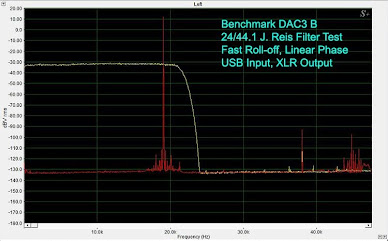Most interesting!
From a practical perspective, would it be generally advisable to avoid those digital filters inside DACs that produce substantial pre-ringing? Or are there other trade-offs that muddy this pond?
As an aside and not directly related to high-res audio, I found this presentation by Jim Hudspeth about the physiology of hearing, down to the molecular level, very fascinating and entertaining:
Have you ever wondered how your ears work? In this delightful and fascinating talk, biophysicist Jim Hudspeth demonstrates the wonderfully simple yet astonishingly powerful mechanics of hair cells, the microscopic powerhouses that make hearing possible -- and explains how, when it's really...

www.ted.com
Unfortunately, using a minimum-phase filter can change the envelope of the high frequency components (as it must). So lose some one way, lose some another. Consider a three-tone complex at 18khz, change one of the sidebands, you change the envelope. Can one hear this? Maybe yes, certainly if one contrives the right signal to make it audible. Same power spectrum, different phase, sounds different because the signal envelope in a particular ERB is changed. That is, audible if one can still hear that frequency range. It all comes down to the issue that if one has a particular transition bandwidth, there is also a central lobe of the filter with corresponding inverse width (i.e. for a steeper filter, the impulse response is longer). Mathematics is very clear about that.
Some folks have proposed a combination of filter, some minimum phase, some constant delay, that might be better. That's the claim, at least.
To explain further, a constant delay filter has a zero pair inside the unit circle matched exactly by a zero pair OUTSIDE the unit circle at 1/roots of the one inside. When one flips one set of roots inside, that changes the phase response of the filter toward minimum phase, one zero pair at a time, while holding absolutely (mathematically to limits of calculation in fact) the same frequency response in terms of magnitude (but not phase). Given that we are talking of filters with many, many pairs of zero pairs, it is possible to have many "optimum" responses that have variation between minimum phase, constant delay, and maximum phase. (where all of the zeros are outside the unit circle).
I will point out that the whole discussion here is based on POSSIBLE mechanisms, there is no evidence (beyond some old rate convertors and DAC's with terrible filters that are not in the present day) yet that there is anything to this, beyond perhaps a slight difference at 44 vs. 48, and doing that in a fair test is an outright (*(&*((&*. So remember that this is to some extent speculation, based on an unpublished work by Tom Stockham, who is quite sadly no longer with us to help out. In the modern day, nobody is concerned, some defend the status quo, and some ask for ridiculous sampling rates. There is a major lack of dialog. Even a negative result in a proper test would advance the science.
On the other hand, I'm a bit skeptical about the "active amplification", there are other hypotheses, for instance Zwislocki's, that explain the same behavior, and that provide the compression via other mechanisms, and also explains the frequency resolution. The problem with active amplification comes from signal to noise ratio issues. This is a long discussion and I won't say for either side is completely right (I suspect some joint solution, frankly, with both detuning via outer hair cells as well as perhaps less amplification via the "active" method. But, in either case, there surely is active behavior, the question "how" remains.) Likewise, it's clear that there are several sources for tinnitus, not just "oscillation". But this is to some extent picking nits, both models result in both the right sensitivity and frequency resolution, as well as as modelling things like auditory masking.
I like that he points out that 0dB SPL is effectively a pressure variation of about 2 * 10^-10 atmospheres, and that 100dB SPL is about 2*10^-5 Atmospheres. Many people do not understand how close to the very unavoidable molecular noise that we can hear.



